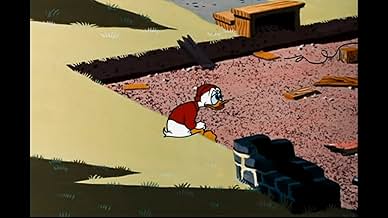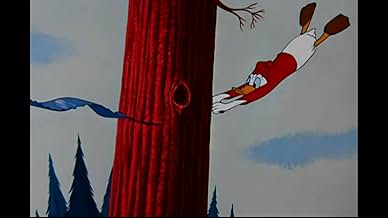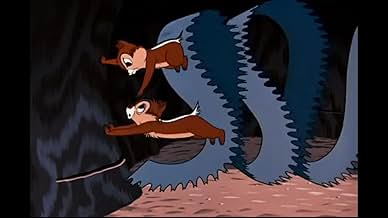Ajouter une intrigue dans votre langueDonald's playing lumberjack, but the targeted tree just happens to be the home of Chip 'n Dale. They give Donald plenty of trouble cutting down the tree, but eventually he succeeds. The wily... Tout lireDonald's playing lumberjack, but the targeted tree just happens to be the home of Chip 'n Dale. They give Donald plenty of trouble cutting down the tree, but eventually he succeeds. The wily chipmunks, though, manage to get their revenge on the homewrecker.Donald's playing lumberjack, but the targeted tree just happens to be the home of Chip 'n Dale. They give Donald plenty of trouble cutting down the tree, but eventually he succeeds. The wily chipmunks, though, manage to get their revenge on the homewrecker.
- Chip
- (voice)
- Dale
- (uncredited)
- Donald Duck
- (uncredited)
- Chip
- (uncredited)
Avis en vedette
Logger Donald finds himself UP A TREE after he attempts to cut down Chip 'n' Dale's home.
Here is another routine Duck versus Chipmunks film, but the antagonists are always a pleasure to watch. Clarence "Ducky" Nash supplies Donald's voice; the Chipmunks are often unintelligible.
Walt Disney (1901-1966) was always intrigued by drawings. As a lad in Marceline, Missouri, he sketched farm animals on scraps of paper; later, as an ambulance driver in France during the First World War, he drew figures on the sides of his vehicle. Back in Kansas City, along with artist Ub Iwerks, Walt developed a primitive animation studio that provided animated commercials and tiny cartoons for the local movie theaters. Always the innovator, his ALICE IN CARTOONLAND series broke ground in placing a live figure in a cartoon universe. Business reversals sent Disney & Iwerks to Hollywood in 1923, where Walt's older brother Roy became his lifelong business manager & counselor. When a mildly successful series with Oswald The Lucky Rabbit was snatched away by the distributor, the character of Mickey Mouse sprung into Walt's imagination, ensuring Disney's immortality. The happy arrival of sound technology made Mickey's screen debut, STEAMBOAT WILLIE (1928), a tremendous audience success with its use of synchronized music. The SILLY SYMPHONIES soon appeared, and Walt's growing crew of marvelously talented animators were quickly conquering new territory with full color, illusions of depth and radical advancements in personality development, an arena in which Walt's genius was unbeatable. Mickey's feisty, naughty behavior had captured millions of fans, but he was soon to be joined by other animated companions: temperamental Donald Duck, intellectually-challenged Goofy and energetic Pluto. All this was in preparation for Walt's grandest dream - feature length animated films. Against a blizzard of doomsayers, Walt persevered and over the next decades delighted children of all ages with the adventures of Snow White, Pinocchio, Bambi, Peter Pan and Mr. Toad. Walt never forgot that his fortunes were all started by a mouse, or that simplicity of message and lots of hard work always pay off.
This exceptionally funny confrontation between Donald and the chipmunks is made even greater than other such encounters (equally funny) by its profusion of stylised backgrounds. The treetop is a confusing three-dimensional labyrinth (apart from the fact that one cannot become trapped) of branches and foliage. This is reflected not just in some particular backgrounds but by the fact that there's always a DIFFERENT background. There's also a remarkable amount of variety in KINDS of backgrounds, within a unified style. Character animation is superb, the gags are amusing, apt, and crisply timed ... but all this goes without saying.
It's also a cartoon I remembered watching as a kid, and Donald Duck climbing and falling up and down the tree was pretty funny stuff. The It's the usual stuff here and the story has a pretty predictable outcome.
It's a funny little cartoon for the kids, but it's more of the same thing - chipmunks has the leg up over the poor Donald.
Grade C+
Le saviez-vous
- AnecdotesThis short features original music by Oliver Wallace.
- Autres versionsIn the UK, the term "fanny" is a slang term for a certain part of a female's anatomy, as opposed to being a slang term for a rear end, like it is in the United States. Therefore, UK showings of this short have Dale only calling Donald "a duck," rather than "a duck with a big fanny," as is the case when the cartoon is uncut.
Meilleurs choix
Détails
- Date de sortie
- Pays d’origine
- Langue
- Aussi connu sous le nom de
- Ein Baum fällt selten allein
- société de production
- Consultez plus de crédits d'entreprise sur IMDbPro
- Durée7 minutes
- Rapport de forme
- 1.37 : 1
Contribuer à cette page



















